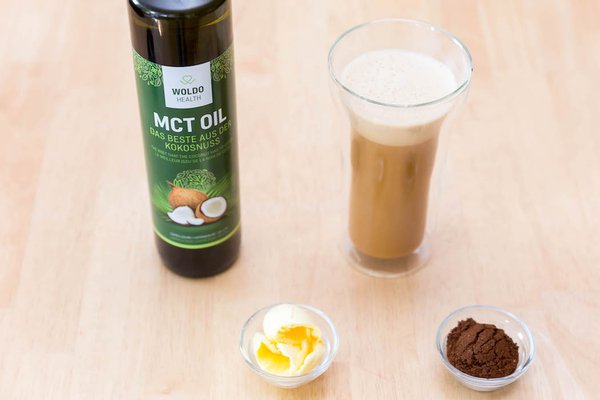Maybe you’ve come across MCT oil in your wellness literature travels (like when reading about bulletproof coffee), or maybe you haven’t. Either way, we’re here to tell you what it’s all about.
MCT stands for the very scientific term “medium-chain triglyceride,” which means that fats, because they’re shorter in length, are more easily digested and tied to a whole slew of health benefits, according to Healthline. MCT oil is a coconut oil extract, with MCTs making up more than half of the fat in coconut oil.
RELATED READ: No, drinking kombucha doesn't 'speed up' your metabolism, experts agree
According to Medical News Today:
MCTs are found in coconut oil and are processed by the body in a different way to long-chain fatty acids. Unlike other fats, they go straight from the gut to the liver. From here, they are used as a source of energy or turned into ketones.
BENEFITS
Here’s where the health benefits begin to kick in.
Ketones, created when the liver breaks down a lot of fat, can be used as fuel for the brain instead of sugar, according to Medical News Today, which explains that the the calories found in MCT oil are used immediately, meaning that it is highly unlikely that they’ll be stored as fat. Preliminary research suggests the oil might have promising effects on the brain function and memory in those with Alzheimer’s disease, Medical News Today reported.
The Alzheimer’s Drug Discovery Foundation holds the following stance on MCT oil:
Although some laboratory studies provide a biological rationale of how MCTs might benefit brain health such as improving brain cell function, preventing Alzheimer's-like pathology, and enhancing learning in older animals, there exists no clinical data that MCTs promote long-term brain health.
Healthline notes that MCT oil may be beneficial for children with autism. Some studies have shown promise that higher-fat and gluten-free diets can improve behavior in autistic children between the ages of 6 and 15, but parents should most certainly talk to their doctor if considering this form of treatment.
Because of their ability to be used as energy, MCTs are thought to promote weight loss or maintenance. Dr. Axe reports that the oil can also increase satiety — the feeling of being full – and increase metabolism. The key to reap the benefits, according to some studies, is long-term consumption, according to Dr. Axe.
MCT oil can lower cholesterol and blood sugar levels, fight bacteria, reduce the risk of heart disease and help manage diabetes.
DOSING
According to Natural Force, it’s best to start small and work your way up when it comes to all supplements, including MCT. Here’s their recommendation for beginners:
• For the first three days, take ~5-7g of MCTs. That’s one teaspoon of MCT oil or two teaspoons of MCT creamer.
• For days 3-6, bump up to ~10g of MCTs. That’s 2 tsp of MCT oil, or 1 tbsp + 1 tsp of MCT creamer.
• On day 7, try a full 14g dose of MCTs. 1 tbsp of MCT oil, or 2 tbsp of MCT creamer.
SIDE EFFECTS
There are, of course, some potential drawbacks with the consumption of MCT oil. While diarrhea may result, it doesn’t cause it more than any other oil does — they all serve as (somewhat) of a natural laxative, Well and Good reports, noting that its high digestibility may result in a sudden and urgent need to visit the restroom.
MCT oil, as a derivative of coconut oil, would not be an ideal supplement option for those who are allergic to coconut oil or coconuts, according to Drugs.com. The website also notes a few other side effects including: stomach ache, skin irritation and vomiting.


